Charles E W Bean, Diaries, AWM38 3DRL 606/116/1 - June - September 1918 - Part 2
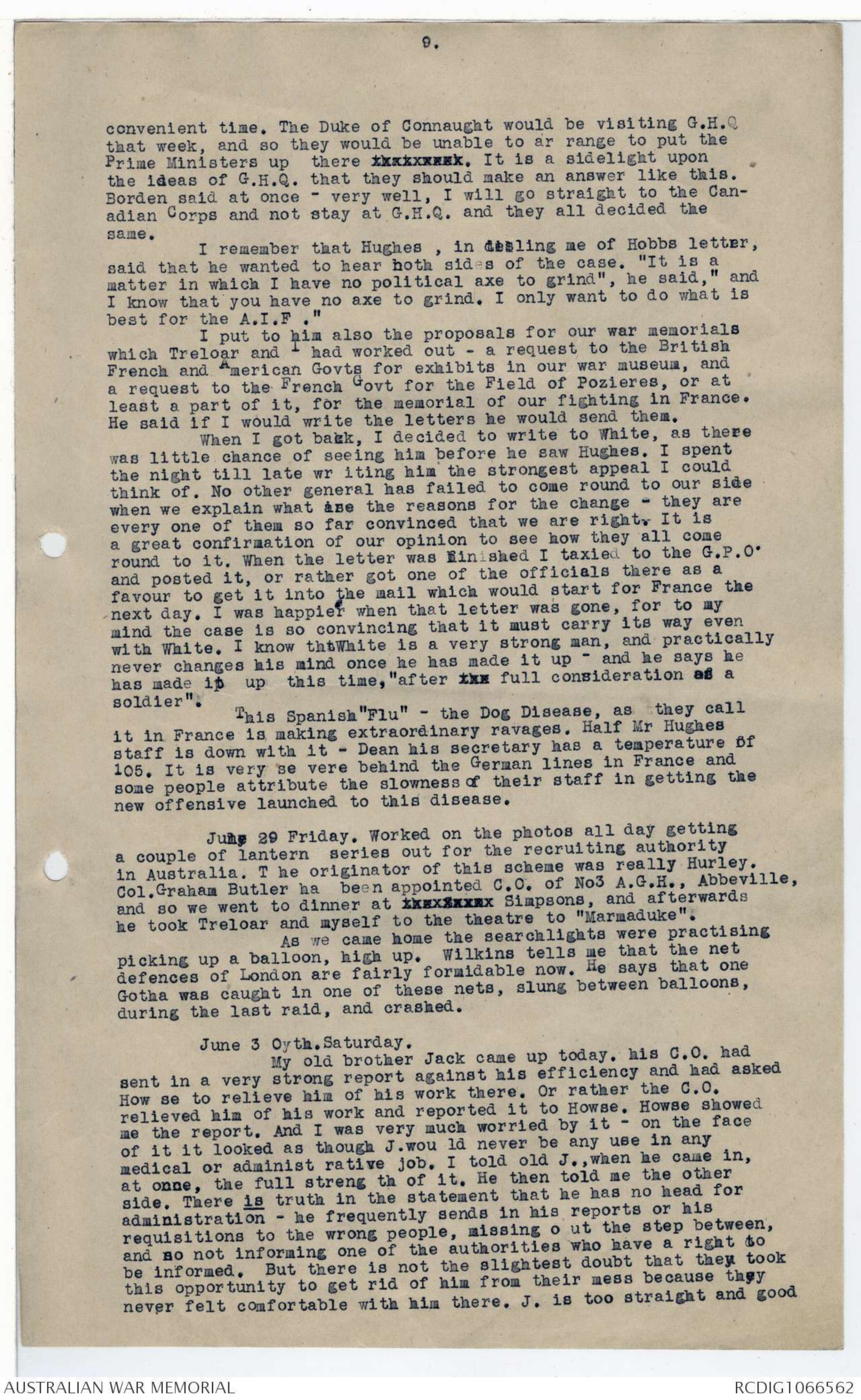
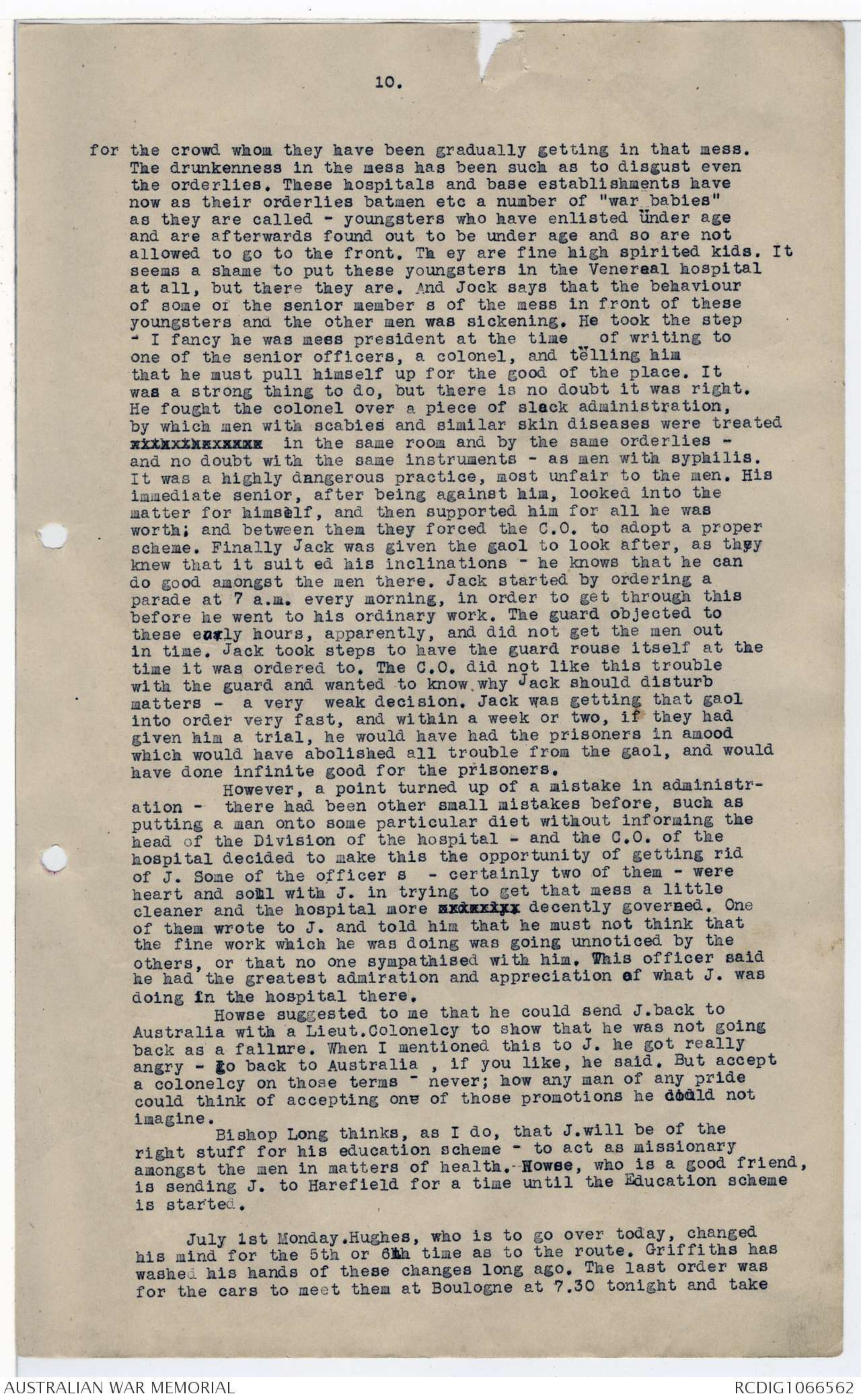
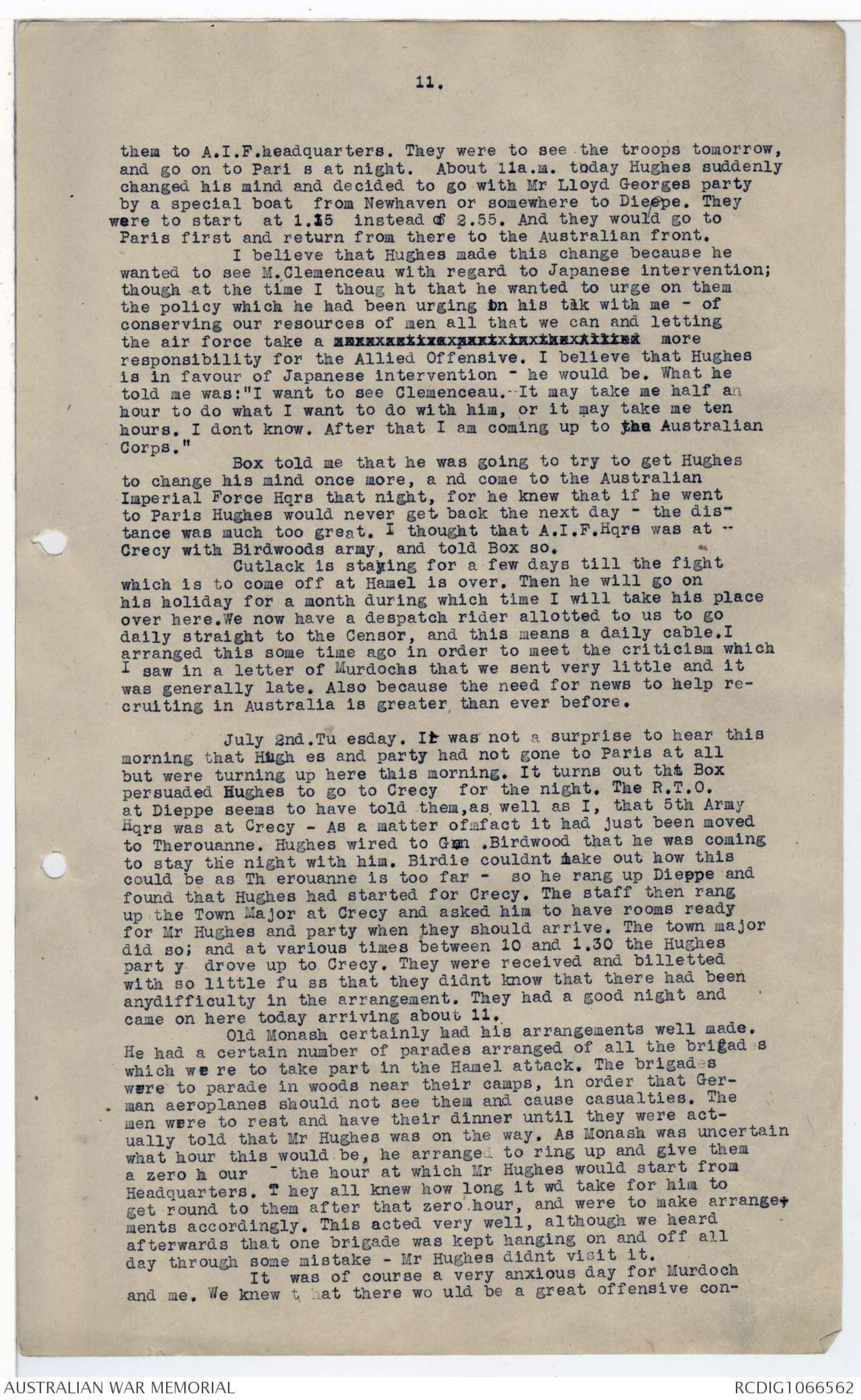
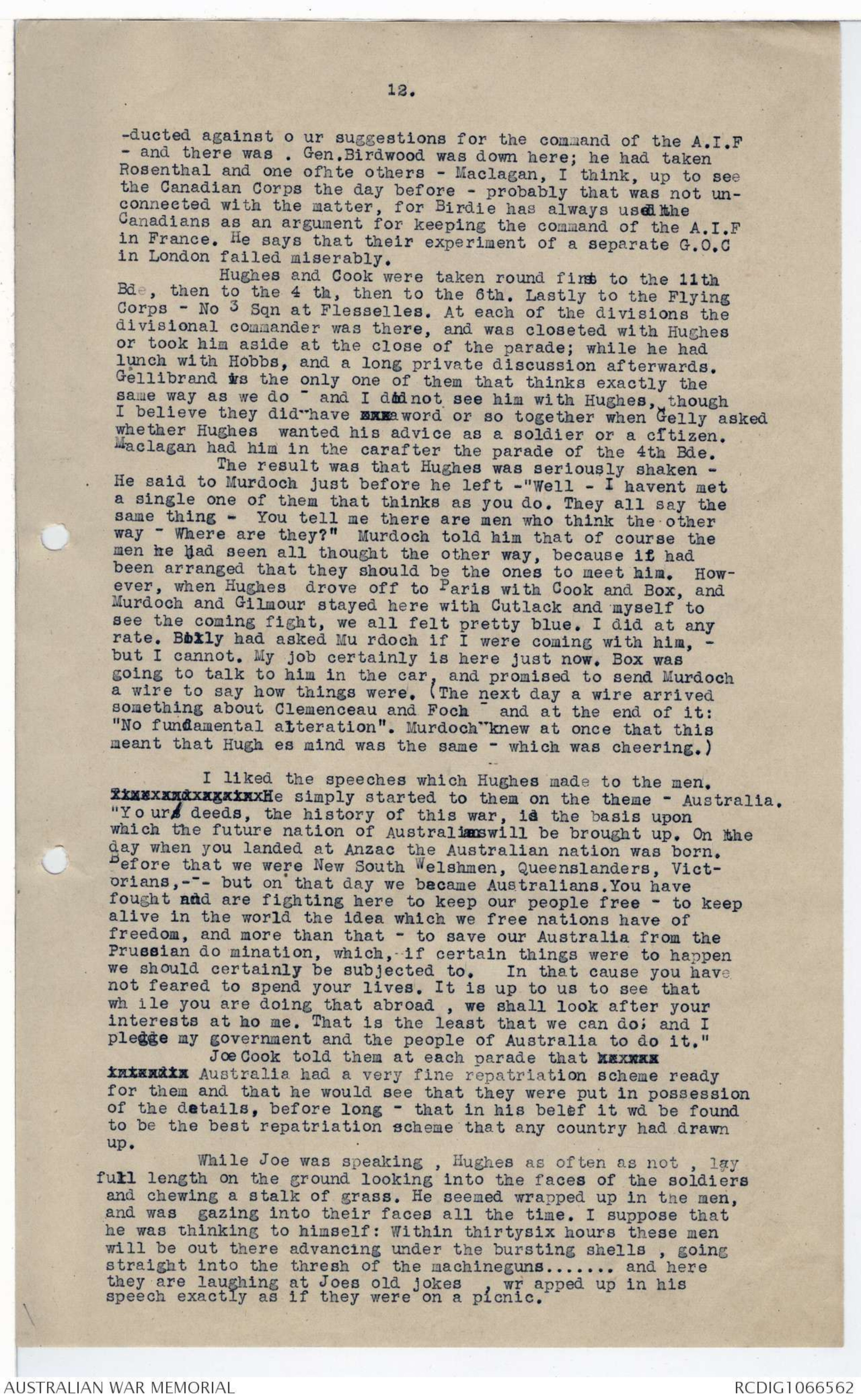
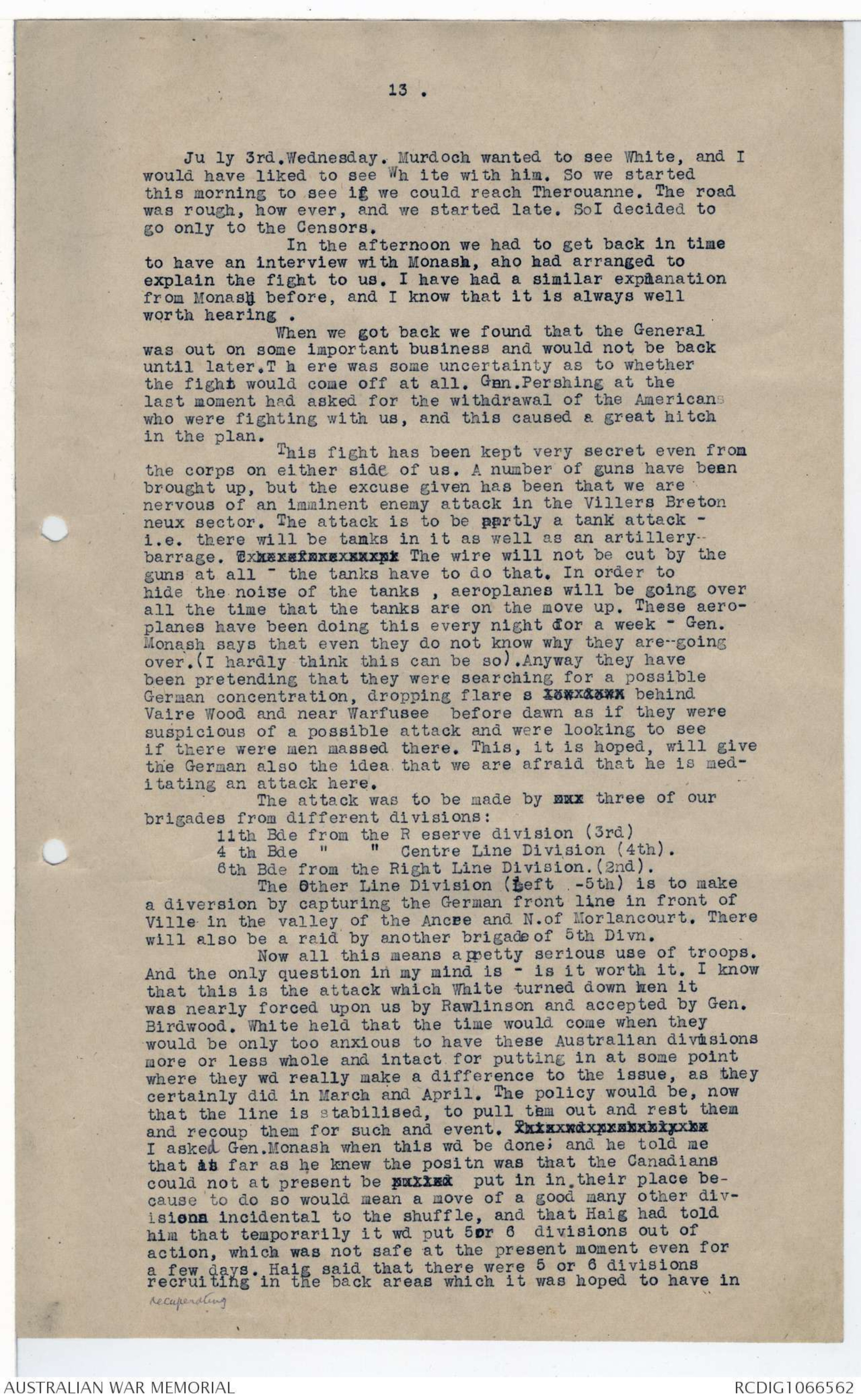
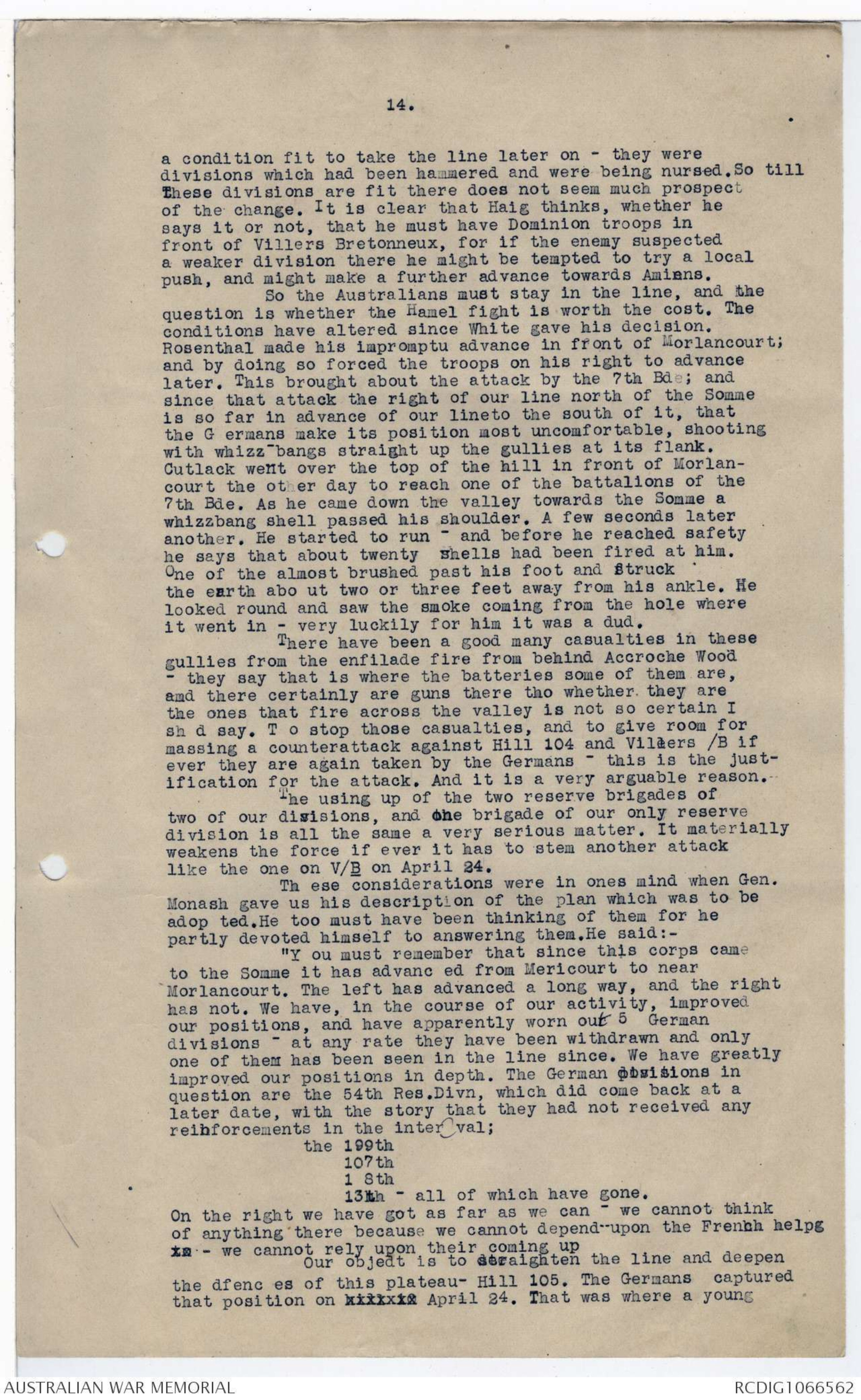
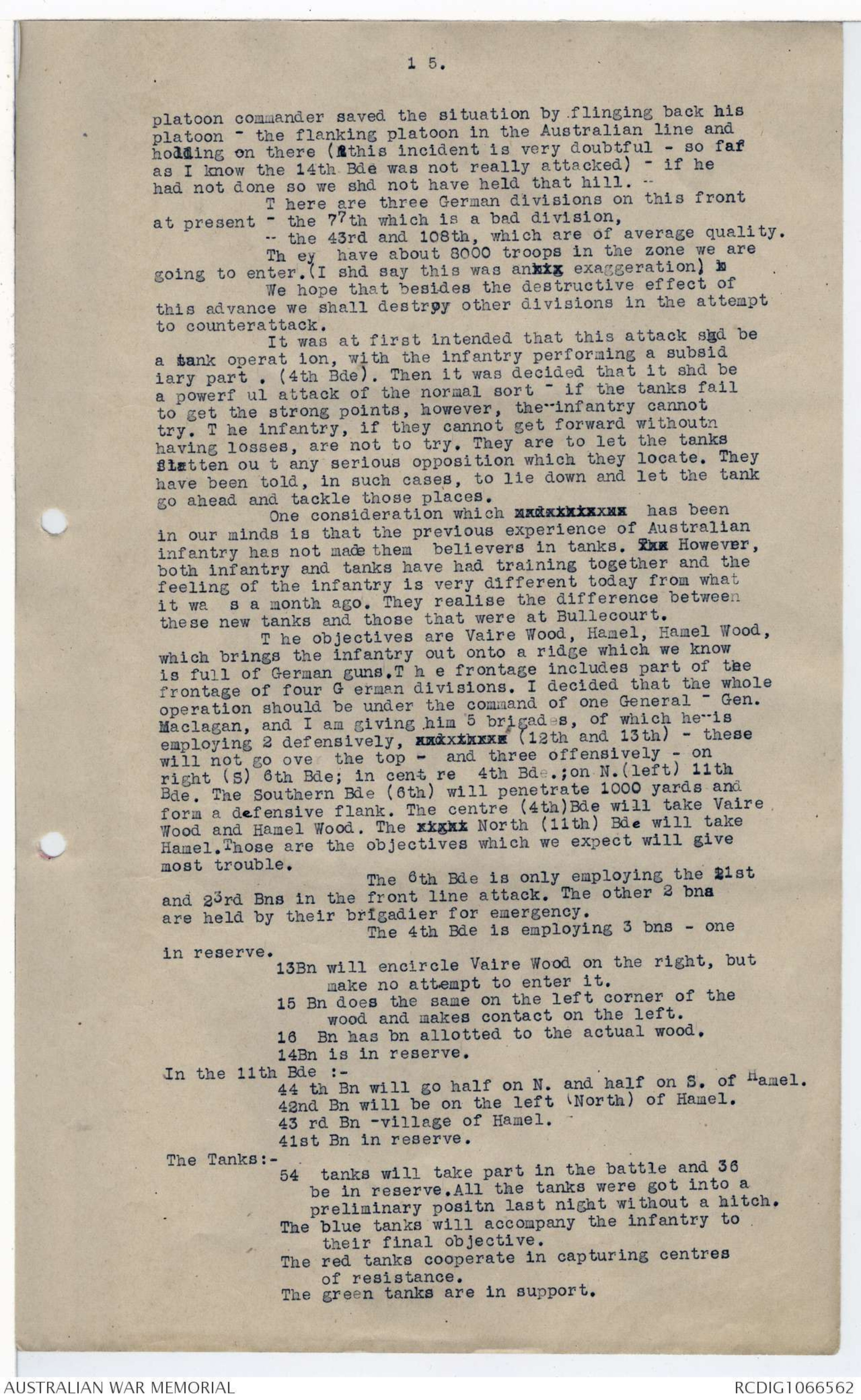
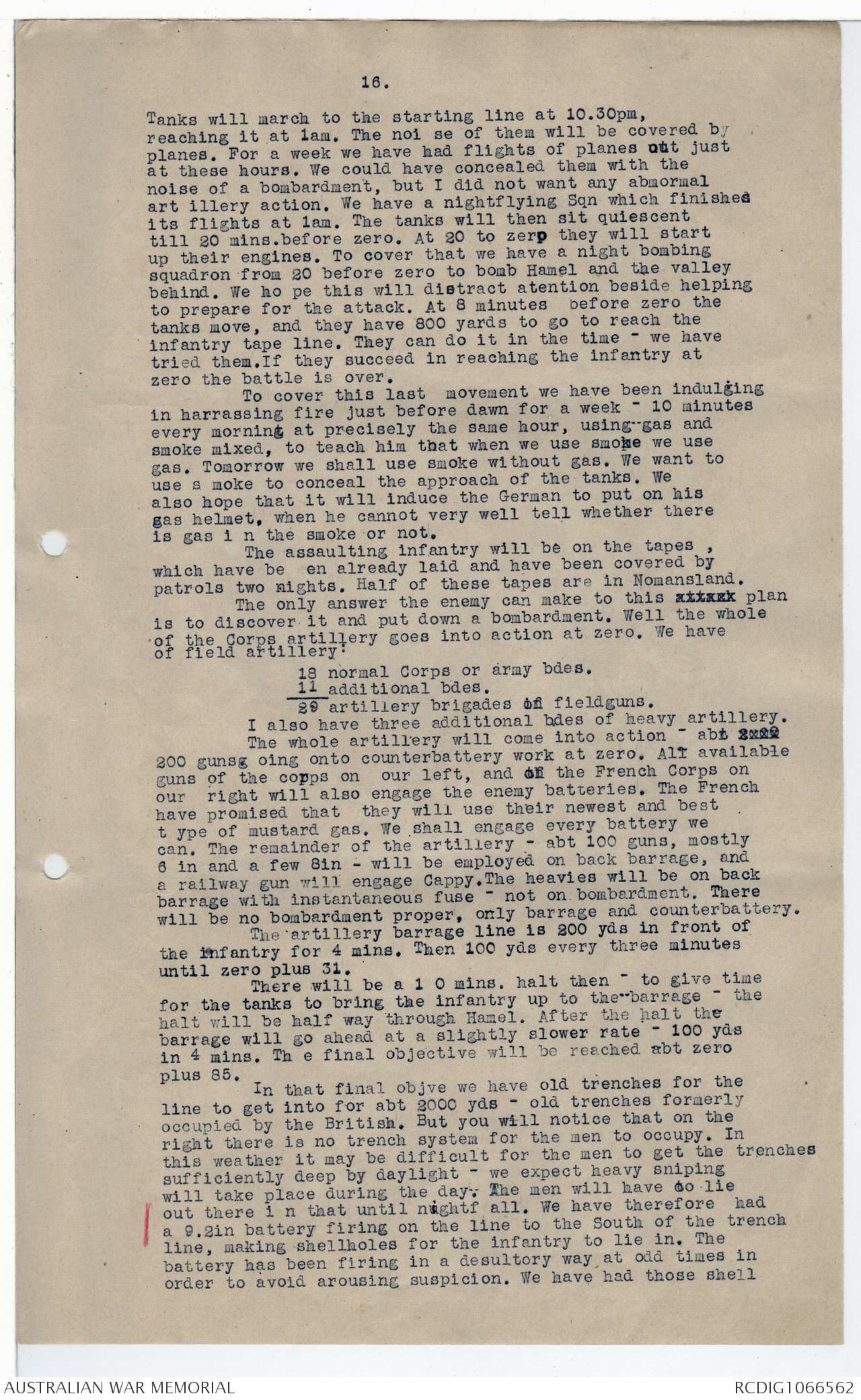
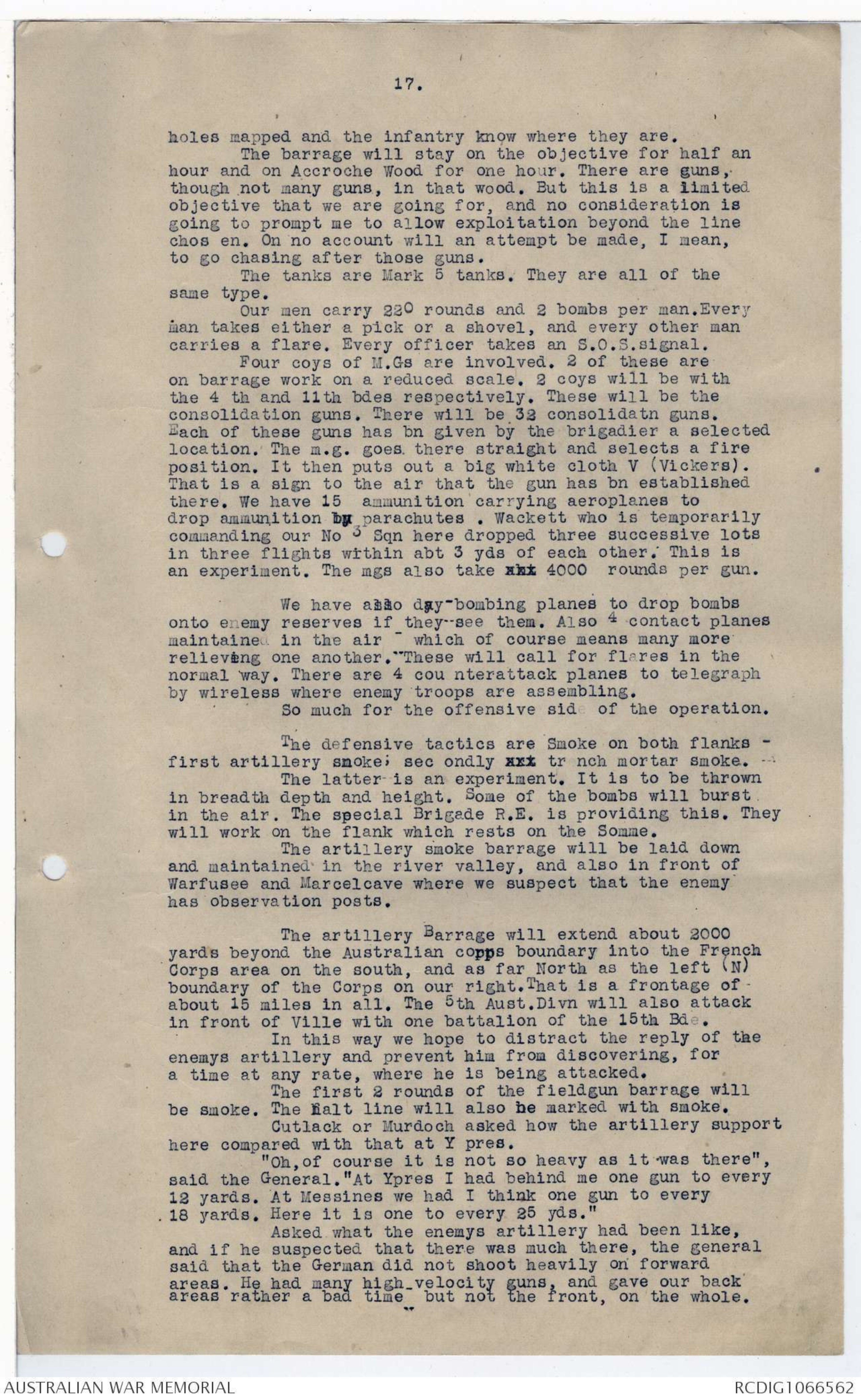
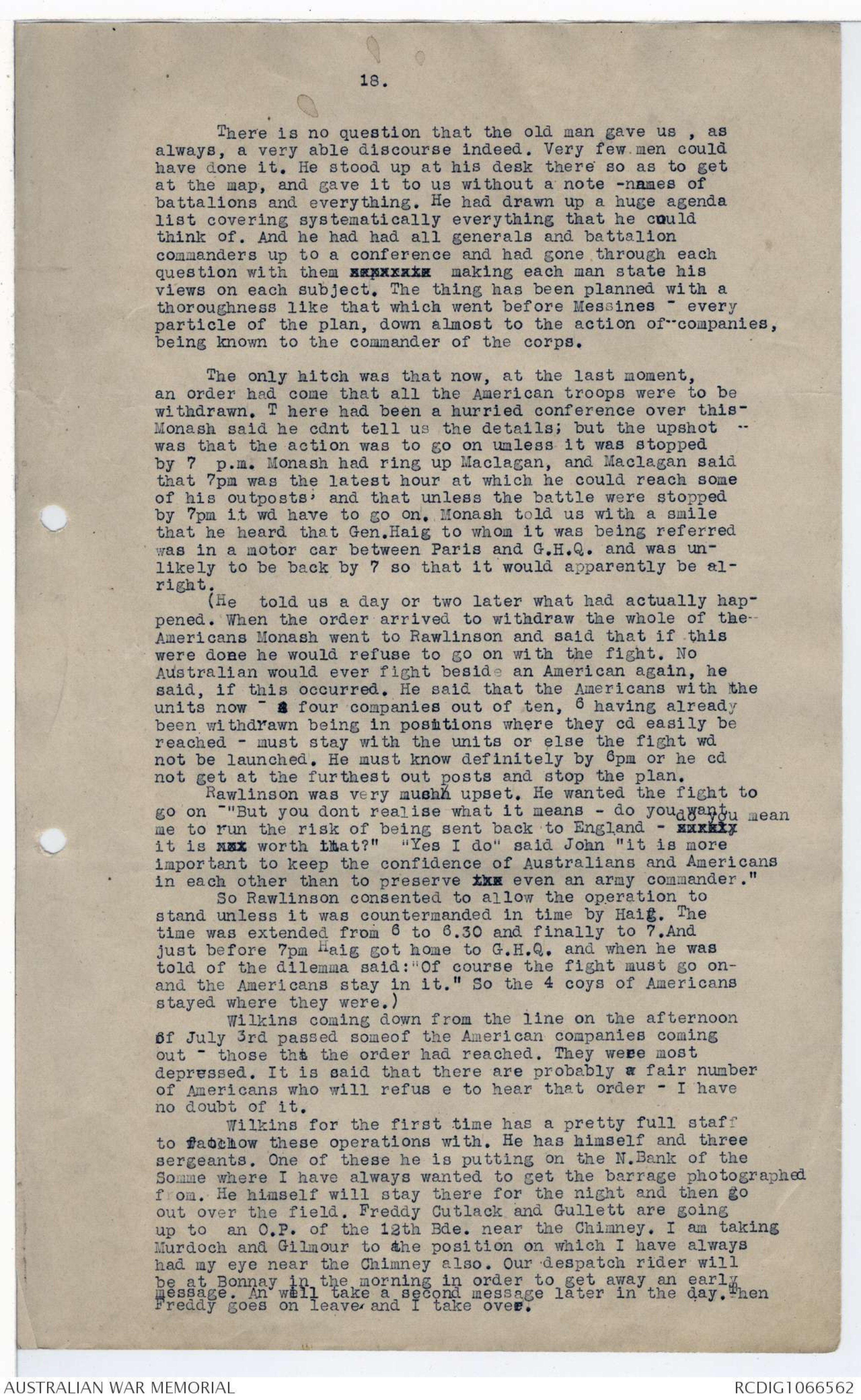
9.
convenient time. The Duke of Connaught would be visiting G.H.Q
that week, and so they would be unable to ar range to put the
Prime Ministers up there that week. It is a sidelight upon
the ideas of G.H.Q. that they should make an answer like this.
Borden said at once - very well, I will go straight to the Canadian
Corps and not stay at G.H.Q. and they all decided the
same.
I remember that Hughes , in telling me of Hobbs letter,
said that he wanted to hear both sides of the case. "It is a
matter in which I have no political axe to grind", he said, " and
I know that you have no axe to grind. I only want to do what is
best for the A.I.F."
I put to him also the proposals for our war memorials
which Treloar and I had worked out - a request to the British
French and American Govts for exhibits in our war museum, and
a request to the French Govt for the Field of Pozieres, or at
least a part of it, for the memorial of our fighting in France.
He said if I would write the letters he would send them.
When I got back, I decided to write to White, as there
was little chance of seeing him before he saw Hughes. I spent
the night till late wr iting him the strongest appeal I could.
think of. No other general has failed to come round to our side
when we explain what are the reasons for the change - they are
every one of them so far convinced that we are right. It is
a great confirmation of our opinion to see how they all come
round to it. When the letter was finished I taxied to the G.P.O.
and posted it, or rather got one of the officials there as a
favour to get it into the mail which would start for France the
next day. I was happier when that letter was gone, for to my
mind the case is so convincing that it must carry its way even
with White. I know thtWhite is a very strong man, and practically
never changes his mind once he has made it up - and he says he
has made it up this time, "after the full consideration as a
soldier".
This Spanish "Flu" - the Dog Disease, as they call
it in France is making extraordinary ravages. Half Mr Hughes
staff is down with it - Dean his secretary has a temperature of
105. It is very se vere behind the German lines in France and
some people attribute the slowness of their staff in getting the
new offensive launched to this disease.
June 29 Friday. Worked on the photos all day getting
a couple of lantern series out for the recruiting authority
in Australia. T he originator of this scheme was really Hurley.
Col.Graham Butler ha been appointed C.O. of No3 A.G.H., Abbeville,
and so we went to dinner at the Sxxx Simpsons, and afterwards
he took Treloar and myself to the theatre to "Marmaduke".
As we came home the searchlights were practising
picking up a balloon, high up. Wilkins tells me that the net
defences of London are fairly formidable now. He says that one
Gotha was caught in one of these nets, slung between balloons,
during the last raid, and crashed.
June 3 0yth.Saturday.
My old brother Jack came up today, his C.O. had
sent in a very strong report against his efficiency and had asked
How se to relieve him of his work there. Or rather the C.O.
relieved him of his work and reported it to Howse. Howse showed
me the report. And I was very much worried by it - on the face
of it it looked as though J. wou ld never be any use in any
medical or administ rative job. I told old J., when he came in,
at once, the full streng th of it. He then told me the other
side. There is truth in the statement that he has no head for
administration - he frequently sends in his reports or his
requisitions to the wrong people, missing o ut the step between,
and so not informing one of the authorities who have a right to
be informed. But there is not the slightest doubt that they took
this opportunity to get rid of him from their mess because they
never felt comfortable with him there. J. is too straight and good
10.
for the crowd whom they have been gradually getting in that mess.
The drunkenness in the mess has been such as to disgust even
the orderlies. These hospitals and base establishments have
now as their orderlies batmen etc a number of "war babies"
as they are called - youngsters who have enlisted under age
and are afterwards found out to be under age and so are not
allowed to go to the front. Th ey are fine high spirited kids. It
seems a shame to put these youngsters in the Venereal hospital
at all, but there they are. And Jock says that the behaviour
of some of the senior member s of the mess in front of these
youngsters and the other men was sickening. He took the step
- I fancy he was mess president at the time of writing to
one of the senior officers, a colonel, and telling him
that he must pull himself up for the good of the place. It
was a strong thing to do, but there is no doubt it was right.
He fought the colonel over a piece of slack administration,
by which men with scabies and similar skin diseases were treatedwith the same in the same room and by the same orderlies -
and no doubt with the same instruments - as men with syphilis.
It was a highly dangerous practice, most unfair to the men. His
immediate senior, after being against him, looked into the
matter for himself, and then supported him for all he was
worth; and between them they forced the C.O. to adopt a proper
scheme. Finally Jack was given the gaol to look after, as they
knew that it suit ed his inclinations - he knows that he can
do good amongst the men there. Jack started by ordering a
parade at 7 a.m. every morning, in order to get through this
before he went to his ordinary work. The guard objected to
these early hours, apparently, and did not get the men out
in time. Jack took steps to have the guard rouse itself at the
time it was ordered to. The C.O. did not like this trouble
with the guard and wanted to know why Jack should disturb
matters - a very weak decision. Jack was getting that gaol
into order very fast, and within a week or two, if they had
given him a trial, he would have had the prisoners in amood
which would have abolished all trouble from the gaol, and would
have done infinite good for the prisoners.
However, a point turned up of a mistake in administration
- there had been other small mistakes before, such as
putting a man onto some particular diet without informing the
head of the Division of the hospital - and the C.O. of the
hospital decided to make this the opportunity of getting rid
of J. Some of the officer s - certainly two of them - were
heart and soul with J. in trying to get that mess a little
cleaner and the hospital more orderly decently governed. One
of them wrote to J. and told him that he must not think that
the fine work which he was doing was going unnoticed by the
others, or that no one sympathised with him. This officer said
he had the greatest admiration and appreciation of what J. was
doing in the hospital there.
Howse suggested to me that he could send J. back to
Australia with a Lieut.Colonelcy to show that he was not going
back as a failure. When I mentioned this to J. he got really
angry - go back to Australia , if you like, he said. But accept
a colonelcy on those terms - never; how any man of any pride
could think of accepting one of those promotions he could not
imagine.
Bishop Long thinks, as I do, that J.will be of the
right stuff for his education scheme - to act as missionary
amongst the men in matters of health. Howse, who is a good friend,
is sending J. to Harefield for a time until the Education scheme
is started.
July 1st Monday.Hughes, who is to go over today, changed
his mind for the 5th or 6th time as to the route. Griffiths has
washed his hands of these changes long ago. The last order was
for the cars to meet them at Boulogne at 7.30 tonight and take
11.
them to A.I.F.headquarters. They were to see the troops tomorrow,
and go on to Pari s at night. About 11a.m. today Hughes suddenly
changed his mind and decided to go with Mr Lloyd Georges party
by a special boat from Newhaven or somewhere to Dieeppe. They
were to start at 1.15 instead of 2.55. And they would go to
Paris first and return from there to the Australian front.
I believe that Hughes made this change because he
wanted to see M.Clemenceau with regard to Japanese intervention;
though at the time I thoug ht that he wanted to urge on them
the policy which he had been urging in his talk with me - of
conserving our resources of men all that we can and letting
the air force take a more active part in the Allied more
responsibility for the Allied Offensive. I believe that Hughes
is in favour of Japanese intervention - he would be. What he
told me was: "I want to see Clemenceau. It may take me half an
hour to do what I want to do with him, or it may take me ten
hours. I dont know. After that I am coming up to the Australian
Corps."
Box told me that he was going to try to get Hughes
to change his mind once more, a nd come to the Australian
Imperial Force Hqrs that night, for he knew that if he went
to Paris Hughes would never get back the next day - the distance
was much too great. I thought that A.I.F.Hqrs was at -
Crecy with Birdwoods army, and told Box so.
Cutlack is staying for a few days till the fight
which is to come off at Hamel is over. Then he will go on
his holiday for a month during which time I will take his place
over here.We now have a despatch rider allotted to us to go
daily straight to the Censor, and this means a daily cable.I
arranged this some time ago in order to meet the criticism which
I saw in a letter of Murdochs that we sent very little and it
was generally late. Also because the need for news to help recruiting
in Australia is greater than ever before.
July 2nd.Tu esday. It was not a surprise to hear this
morning that Hugh es and party had not gone to Paris at all
but were turning up here this morning. It turns out tht Box
persuaded Hughes to go to Crecy for the night. The R.T.O.
at Dieppe seems to have told them,as well as I, that 5th Army
Hqrs was at Crecy - As a matter ofmfact it had just been moved
to Therouanne. Hughes wired to Gen .Birdwood that he was coming
to stay the night with him. Birdie couldnt make out how this
could be as Th erouanne is too far - so he rang up Dieppe and
found that Hughes had started for Crecy. The staff then rang
up the Town Major at Crecy and asked him to have rooms ready
for Mr Hughes and party when they should arrive. The town major
did so; and at various times between 10 and 1.30 the Hughes
part y drove up to Crecy. They were received and billetted
with so little fu ss that they didnt know that there had been
anydifficulty in the arrangement. They had a good night and
came on here today arriving about 11.
Old Monash certainly had his arrangements well made.
He had a certain number of parades arranged of all the brigades
which we re to take part in the Hamel attack. The brigades
were to parade in woods near their camps, in order that German
aeroplanes should not see them and cause casualties. The
men were to rest and have their dinner until they were actually
told that Mr Hughes was on the way. As Monash was uncertain
what hour this would be, he arranged to ring up and give them
a zero h our - the hour at which Mr Hughes would start from
Headquarters. T hey all knew how long it wd take for him to
get round to them after that zero hour, and were to make arrangements
accordingly. This acted very well, although we heard
afterwards that one brigade was kept hanging on and off all
day through some mistake - Mr Hughes didnt visit it.
It was of course a very anxious day for Murdoch
and me. We knew t hat there wo uld be a great offensive conducted
12.
against o ur suggestions for the command of the A.I.F
- and there was . Gen.Birdwood was down here; he had taken
Rosenthal and one ofhte others - Maclagan, I think, up to see
the Canadian Corps the day before - probably that was not unconnected
with the matter, for Birdie has always used the
Canadians as an argument for keeping the command of the A.I.F
in France. He says that their experiment of a separate G.O.C
in London failed miserably.
Hughes and Cook were taken round first to the 11th
Bde, then to the 4 th, then to the 6th. Lastly to the Flying
Corps - No 3 Sqn at Flesselles. At each of the divisions the
divisional commander was there, and was closeted with Hughes
or took him aside at the close of the parade; while he had
lunch with Hobbs, and a long private discussion afterwards.
Gellibrand is the only one of them that thinks exactly the
same way as we do - and I did not see him with Hughes, though
I believe they did have onea word or so together when Gelly asked
whether Hughes wanted his advice as a soldier or a citizen.
Maclagan had him in the carafter the parade of the 4th Bde.
The result was that Hughes was seriously shaken -
He said to Murdoch just before he left -"Well - I havent met
a single one of them that thinks as you do. They all say the
same thing - You tell me there are men who think the other
way - Where are they?" Murdoch told him that of course the
men he had seen all thought the other way, because it had
been arranged that they should be the ones to meet him. However,
when Hughes drove off to Paris with Cook and Box, and
Murdoch and Gilmour stayed here with Cutlack and myself to
see the coming fight, we all felt pretty blue. I did at any
rate. Bixly had asked Mu rdoch if I were coming with him, -
but I cannot. My job certainly is here just now. Box was
going to talk to him in the car, and promised to send Murdoch
a wire to say how things were. (The next day a wire arrived
something about Clemenceau and Foch and at the end of it:
"No fundamental alteration". Murdoch knew at once that this
meant that Hugh es mind was the same - which was cheering.)
I liked the speeches which Hughes made to the men.Time amd againHe simply started to them on the theme - Australia.
"Yours deeds, the history of this war, is the basis upon
which the future nation of Australianswill be brought up. On the
day when you landed at Anzac the Australian nation was born.
Before that we were New South Welshmen, Queenslanders, Victorians,
--- but on that day we became Australians. You have
fought and are fighting here to keep our people free - to keep
alive in the world the idea which we free nations have of
freedom, and more than that - to save our Australia from the
Prussian do mination, which, if certain things were to happen
we should certainly be subjected to. In that cause you have
not feared to spend your lives. It is up to us to see that
wh ile you are doing that abroad , we shall look after your
interests at ho me. That is the least that we can do; and I
pledge my government and the people of Australia to do it."
Joe Cook told them at each parade that he wasintendin Australia had a very fine repatriation scheme ready
for them and that he would see that they were put in possession
of the details, before long - that in his belef it wd be found
to be the best repatriation scheme that any country had drawn
up.
While Joe was speaking, Hughes as often as not , lay
full length on the ground looking into the faces of the soldiers
and chewing a stalk of grass. He seemed wrapped up in the men,
and was gazing into their faces all the time. I suppose that
he was thinking to himself: Within thirtysix hours these men
will be out there advancing under the bursting shells , going
straight into the thresh of the machineguns . . . . and here
they are laughing at Joes old jokes , wr apped up in his
speech exactly as if they were on a picnic.
13 .
Ju ly 3rd.Wednesday. Murdoch wanted to see White, and I
would have liked to see Wh ite with him. So we started
this morning to see if we could reach Therouanne. The road
was rough, how ever, and we started late. SoI decided to
go only to the Censors.
In the afternoon we had to get back in time
to have an interview with Monash, aho had arranged to
explain the fight to us. I have had a similar explanation
from Monash before, and I know that it is always well
worth hearing .
When we got back we found that the General
was out on some important business and would not be back
until later.T h ere was some uncertainty as to whether
the fight would come off at all. Gen.Pershing at the
last moment had asked for the withdrawal of the Americans
who were fighting with us, and this caused a great hitch
in the plan.
This fight has been kept very secret even from
the corps on either side of us. A number of guns have been
brought up, but the excuse given has been that we are
nervous of an imminent enemy attack in the Villers Bretonneux
sector. The attack is to be partly a tank attack -
i.e. there will be tanks in it as well as an artillery
barrage. T hereforexsurpr The wire will not be cut by the
guns at all - the tanks have to do that. In order to
hide the noise of the tanks , aeroplanes will be going over
all the time that the tanks are on the move up. These aeroplanes
have been doing this every night for a week - Gen.
Monash says that even they do not know why they are going
over.(I hardly think this can be so) .Anyway they have
been pretending that they were searching for a possible
German concentration, dropping flare s low down behind
Vaire Wood and near Warfusee before dawn as if they were
suspicious of a possible attack and were looking to see
if there were men massed there. This, it is hoped, will give
the German also the idea that we are afraid that he is meditating
an attack here.
The attack was to be made by our three of our
brigades from different divisions:
11th Bde from the R eserve division (3rd)
4 th Bde " " Centre Line Division (4th).
6th Bde from the Right Line Division. (2nd).
The Other Line Division (Left -5th) is to make
a diversion by capturing the German front line in front of
Ville in the valley of the Ancre and N.of Morlancourt. There
will also be a raid by another brigade of 5th Divn.
Now all this means a pretty serious use of troops.
And the only question in my mind is - is it worth it. I know
that this is the attack which White turned down when it
was nearly forced upon us by Rawlinson and accepted by Gen.
Birdwood. White held that the time would come when they
would be only too anxious to have these Australian divisions
more or less whole and intact for putting in at some point
where they wd really make a difference to the issue, as they
certainly did in March and April. The policy would be, now
that the line is stabilised, to pull tem out and rest them
and recoup them for such and event. This wd probably be
I asked Gen. Monash when this wd be done; and he told me
that as far as he knew the positn was that the Canadians
could not at present be pulled put in in.their place because
to do so would mean a move of a good many other divisions
incidental to the shuffle, and that Haig had told
him that temporarily it wd put 5or 6 divisions out of
action, which was not safe at the present moment even for
a few days. Haig said that there were 5 or 6 divisions
recruiting [*recuperating*] in the back areas which it was hoped to have in
14.
a condition fit to take the line later on - they were
divisions which had been hammered and were being nursed.So till
these divisions are fit there does not seem much prospect
of the change. It is clear that Haig thinks, whether he
says it or not, that he must have Dominion troops in
front of Villers Bretonneux, for if the enemy suspected
a weaker division there he might be tempted to try a local
push, and might make a further advance towards Amiens.
So the Australians must stay in the line, and the
question is whether the Hamel fight is worth the cost. The
conditions have altered since White gave his decision.
Rosenthal made his impromptu advance in front of Morlancourt;
and by doing so forced the troops on his right to advance
later. This brought about the attack by the 7th Bde; and
since that attack the right of our line north of the Somme
is so far in advance of our lineto the south of it, that
the G ermans make its position most uncomfortable, shooting
with whizz bangs straight up the gullies at its flank.
Cutlack went over the top of the hill in front of Morlancourt
the other day to reach one of the battalions of the
7th Bde. As he came down the valley towards the Somme a
whizzbang shell passed his shoulder. A few seconds later
another. He started to run - and before he reached safety
he says that about twenty shells had been fired at him.
One of the almost brushed past his foot and struck
the earth abo ut two or three feet away from his ankle. He
looked round and saw the smoke coming from the hole where
it went in - very luckily for him it was a dud.
There have been a good many casualties in these
gullies from the enfilade fire from behind Accroche Wood
- they say that is where the batteries some of them are,
amd there certainly are guns there tho whether they are
the ones that fire across the valley is not so certain I
sh d say. T o stop those casualties, and to give room for
massing a counterattack against Hill 104 and Villers /B if
ever they are again taken by the Germans - this is the justification
for the attack. And it is a very arguable reason.
The using up of the two reserve brigades of
two of our divisions, and one brigade of our only reserve
division is all the same a very serious matter. It materially
weakens the force if ever it has to stem another attack
like the one on V/B on April 24.
Th ese considerations were in ones mind when Gen.
Monash gave us his description of the plan which was to be
adop ted.He too must have been thinking of them for he
partly devoted himself to answering them.He said:-
"Y ou must remember that since this corps came
to the Somme it has advanc ed from Mericourt to near
Morlancourt. The left has advanced a long way, and the right
has not. We have, in the course of our activity, improved
our positions, and have apparently worn out 5 German
divisions - at any rate they have been withdrawn and only
one of them has been seen in the line since. We have greatly
improved our positions in depth. The German divisions in
question are the 54th Res.Divn, which did come back at a
later date, with the story that they had not received any
reinforcements in the inter val;
the 199th
107th
1 8th
13th - all of which have gone.
On the right we have got as far as we can - we cannot think
of anything there because we cannot depend upon the French helpgto - we cannot rely upon their coming up
Our object is to straighten the line and deepen
the dfenc es of this plateau- Hill 105. The Germans captured
that position on hill 10 April 24. That was where a young
1 5.
platoon commander saved the situation by flinging back his
platoon - the flanking platoon in the Australian line and
holding on there (hthis incident is very doubtful - so far
as I know the 14th Bde was not really attacked) - if he
had not done so we shd not have held that hill.
T here are three German divisions on this front
at present - the 77th which is a bad division,
- the 43rd and 108th, which are of average quality.
Th ey, have about 8000 troops in the zone we are
going to enter.(I shd say this was anbig exaggeration) x
We hope that besides the destructive effect of
this advance we shall destroy other divisions in the attempt
to counterattack.
It was at first intended that this attack shd be
a tank operat ion, with the infantry performing a subsidiary
part. (4th Bde). Then it was decided that it shd be
a powerf ul attack of the normal sort - if the tanks fail
to get the strong points, however, the infantry cannot
try. T he infantry, if they cannot get forward withoutn
having losses, are not to try. They are to let the tanks
flatten ou t any serious opposition which they locate. They
have been told, in such cases, to lie down and let the tank
go ahead and tackle those places.
One consideration which made this un has been
in our minds is that the previous experience of Australian
infantry has not made them believers in tanks. The However,
both infantry and tanks have had training together and the
feeling of the infantry is very different today from what
it wa s a month ago. They realise the difference between
these new tanks and those that were at Bullecourt.
T he objectives are Vaire Wood, Hamel, Hamel Wood,
which brings the infantry out onto a ridge which we know
is full of German guns.T h e frontage includes part of the
frontage of four G erman divisions. I decided that the whole
operation should be under the command of one General - Gen.
Maclagan, and I am giving him 5 brigades, of which he is
employing 2 defensively, and three (12th and 13th) - these
will not go over the top - and three offensively - on
right (S) 6th Bde; in cent re 4th Bde.;on N. (left) 11th
Bde. The Southern Bde (6th) will penetrate 1000 yards and
form a defensive flank. The centre (4th)Bde will take Vaire
Wood and Hamel Wood. The right North (11th) Bde will take
Hamel.Those are the objectives which we expect will give
most trouble.
The 6th Bde is only employing the 21st
and 23rd Bns in the front line attack. The other 2 bns
are held by their brigadier for emergency.
The 4th Bde is employing 3 bns - one
in reserve.
13Bn will encircle Vaire Wood on the right, but
make no attempt to enter it.
15 Bn does the same on the left corner of the
wood and makes contact on the left.
16 Bn has bn allotted to the actual wood.
14Bn is in reserve.
In the 11th Bde :-
44 th Bn will go half on N. and half on S. of Hamel.
42nd Bn will be on the left (North) of Hamel.
43 rd Bn -village of Hamel.
41st Bn in reserve.
The Tanks:-
54 tanks will take part in the battle and 36
be in reserve.All the tanks were got into a
preliminary positn last night without a hitch.
The blue tanks will accompany the infantry to
their final objective.
The red tanks cooperate in capturing centres
of resistance.
The green tanks are in support.
16.
Tanks will march to the starting line at 10.30pm,
reaching it at 1am. The noi se of them will be covered by
planes. For a week we have had flights of planes out just
at these hours. We could have concealed them with the
noise of a bombardment, but I did not want any abmormal
art illery action. We have a nightflying Sqn which finishes
its flights at 1am. The tanks will then sit quiescent
till 20 mins.before zero. At 20 to zero they will start
up their engines. To cover that we have a night bombing
squadron from 20 before zero to bomb Hamel and the valley
behind. We ho pe this will distract atention beside helping
to prepare for the attack. At 8 minutes before zero the
tanks move, and they have 800 yards to go to reach the
infantry tape line. They can do it in the time - we have
tried them.If they succeed in reaching the infantry at
zero the battle is over.
To cover this last movement we have been indulging
in harrassing fire just before dawn for a week - 10 minutes
every morning at precisely the same hour, using gas and
smoke mixed, to teach him that when we use smoke we use
gas. Tomorrow we shall use smoke without gas. We want to
use s moke to conceal the approach of the tanks. We
also hope that it will induce the German to put on his
gas helmet, when he cannot very well tell whether there
is gas i n the smoke or not.
The assaulting infantry will be on the tapes ,
which have be en already laid and have been covered by
patrols two nights. Half of these tapes are in Nomansland.
The only answer the enemy can make to this attack plan
is to discover it and put down a bombardment. Well the whole
of the Corps artillery goes into action at zero. We have
of field artillery:
18 normal Corps or army bdes.
11 additional bdes.
29 artillery brigades of fieldguns.
I also have three additional bdes of heavy artillery.
The whole artillery will come into action - abt 2000
200 gunsg oing onto counterbattery work at zero. All available
guns of the corps on our left, and of the French Corps on
our right will also engage the enemy batteries. The French
have promised that they will use their newest and best
t ype of mustard gas. We shall engage every battery we
can. The remainder of the artillery - abt 100 guns, mostly
6 in and a few 8in - will be employed on back barrage, and
a railway gun will engage Cappy.The heavies will be on back
barrage with instantaneous fuse - not on bombardment. There
will be no bombardment proper, only barrage and counterbattery.
The artillery barrage line is 200 yds in front of
the infantry for 4 mins. Then 100 yds every three minutes
until zero plus 31.
There will be a 1 0 mins. halt then - to give time
for the tanks to bring the infantry up to the barrage - the
halt will be half way through Hamel. After the halt the
barrage will go ahead at a slightly slower rate - 100 yds
in 4 mins. Th e final objective will be reached abt zero
plus 85.
In that final objve we have old trenches for the
line to get into for abt 2000 yds - old trenches formerly
occupied by the British. But you will notice that on the
right there is no trench system for the men to occupy. In
this weather it may be difficult for the men to get the trenches
sufficiently deep by daylight - we expect heavy sniping
will take place during the day. The men will have to lie
out there i n that until nightf all. We have therefore had
a 9.2in battery firing on the line to the South of the trench
line, making shellholes for the infantry to lie in. The
battery has been firing in a desultory way, at odd times in
order to avoid arousing suspicion. We have had those shell
17.
holes mapped and the infantry know where they are.
The barrage will stay on the objective for half an
hour and on Accroche Wood for one hour. There are guns,
though not many guns, in that wood. But this is a limited
objective that we are going for, and no consideration is
going to prompt me to allow exploitation beyond the line
chos en. On no account will an attempt be made, I mean,
to go chasing after those guns.
The tanks are Mark 5 tanks. They are all of the
same type.
Our men carry 220 rounds and 2 bombs per man.Every
man takes either a pick or a shovel, and every other man
carries a flare. Every officer takes an S.O.S.signal.
Four coys of M.Gs are involved. 2 of these are
on barrage work on a reduced scale. 2 coys will be with
the 4 th and 11th bdes respectively. These will be the
consolidation guns. There will be 32 consolidatn guns.
Each of these guns has bn given by the brigadier a selected
location. The m.g. goes there straight and selects a fire
position. It then puts out a big white cloth V (Vickers).
That is a sign to the air that the gun has bn established
there. We have 15 ammunition carrying aeroplanes to
drop ammunition by parachutes . Wackett who is temporarily
commanding our No 3 Sqn here dropped three successive lots
in three flights within abt 3 yds of each other. This is
an experiment. The mgs also take abt 4000 rounds per gun.
We have also day-bombing planes to drop bombs
onto enemy reserves if they see them. Also 4 contact planes
maintained in the air - which of course means many more
relieving one another. These will call for flares in the
normal way. There are 4 cou nterattack planes to telegraph
by wireless where enemy troops are assembling.
So much for the offensive side of the operation.
The defensive tactics are Smoke on both flanks -
first artillery smoke: sec ondly act trench mortar smoke.
The latter is an experiment. It is to be thrown
in breadth depth and height. Some of the bombs will burst
in the air. The special Brigade R.E. is providing this. They
will work on the flank which rests on the Somme.
The artillery smoke barrage will be laid down
and maintained in the river valley, and also in front of
Warfusee and Marcelcave where we suspect that the enemy
has observation posts.
The artillery Barrage will extend about 2000
yards beyond the Australian corps boundary into the French
Corps area on the south, and as far North as the left (N)
boundary of the Corps on our right.That is a frontage of
about 15 miles in all. The 5th Aust.Divn will also attack
in front of Ville with one battalion of the 15th Bde.
In this way we hope to distract the reply of the
enemys artillery and prevent him from discovering, for
a time at any rate, where he is being attacked.
The first 2 rounds of the fieldgun barrage will
be smoke. The halt line will also be marked with smoke.
Cutlack or Murdoch asked how the artillery support
here compared with that at Y pres.
"Oh, of course it is not so heavy as it was there",
said the General. "At Ypres I had behind me one gun to every
12 yards. At Messines we had I think one gun to every
18 yards. Here it is one to every 25 yds.'"
Asked what the enemys artillery had been like,
and if he suspected that there was much there, the general
said that the German did not shoot heavily on forward
areas. He had many high velocity guns, and gave our back
areas rather a bad time, but not the front, on the whole.
18.
There is no question that the old man gave us , as
always, a very able discourse indeed. Very few men could
have done it. He stood up at his desk there so as to get
at the map, and gave it to us without a note -names of
battalions and everything. He had drawn up a huge agenda
list covering systematically everything that he could
think of. And he had had all generals and battalion
commanders up to a conference and had gone through each
question with them separate making each man state his
views on each subject. The thing has been planned with a
thoroughness like that which went before Messines - every
particle of the plan, down almost to the action of companies,
being known to the commander of the corps.
The only hitch was that now, at the last moment,
an order had come that all the American troops were to be
withdrawn. T here had been a hurried conference over this-
Monash said he cdnt tell us the details; but the upshot
was that the action was to go on umless it was stopped
by 7 p.m. Monash had ring up Maclagan, and Maclagan said
that 7pm was the latest hour at which he could reach some
of his outposts; and that unless the battle were stopped
by 7pm it wd have to go on. Monash told us with a smile
that he heard that Gen.Haig to whom it was being referred
was in a motor car between Paris and G.H.Q. and was unlikely
to be back by 7 so that it would apparently be alright.
(He told us a day or two later what had actually happened.
When the order arrived to withdraw the whole of the
Americans Monash went to Rawlinson and said that if this
were done he would refuse to go on with the fight. No
Australian would ever fight beside an American again, he
said, if this occurred. He said that the Americans with the
units now - n four companies out of ten, 6 having already
been withdrawn being in positions where they cd easily be
reached - must stay with the units or else the fight wd
not be launched. He must know definitely by 6pm or he cd
not get at the furthest out posts and stop the plan.
Rawlinson was very muchh upset. He wanted the fight to
go on -"But you dont realise what it means - do you want
me to run the risk of being sent back to England - surely do you mean
it is not worth that?" "Yes I do" said John "it is more
important to keep the confidence of Australians and Americans
in each other than to preserve the even an army commander."
So Rawlinson consented to allow the operation to
stand unless it was countermanded in time by Haig. The
time was extended from 6 to 6.30 and finally to 7.And
just before 7pm Haig got home to G.H.Q. and when he was
told of the dilemma said:"Of course the fight must go on-
and the Americans stay in it." So the 4 coys of Americans
stayed where they were.)
Wilkins coming down from the line on the afternoon
of July 3rd passed someof the American companies coming
out - those tht the order had reached. They were most
depressed. It is said that there are probably a fair number
of Americans who will refus e to hear that order - I have
no doubt of it.
Wilkins for the first time has a pretty full staff
to faollow these operations with. He has himself and three
sergeants. One of these he is putting on the N.Bank of the
Somme where I have always wanted to get the barrage photographed
from. He himself will stay there for the night and then go
out over the field. Freddy Cutlack and Gullett are going
up to an O.P. of the 12th Bde. near the Chimney. I am taking
Murdoch and Gilmour to the position on which I have always
had my eye near the Chimney also. Our despatch rider will
be at Bonnay in the morning in order to get away an early
message. An will take a second message later in the day. Then
Freddy goes on leave and I take over.
 Deb Parkinson
Deb ParkinsonThis transcription item is now locked to you for editing. To release the lock either Save your changes or Cancel.
This lock will be automatically released after 60 minutes of inactivity.